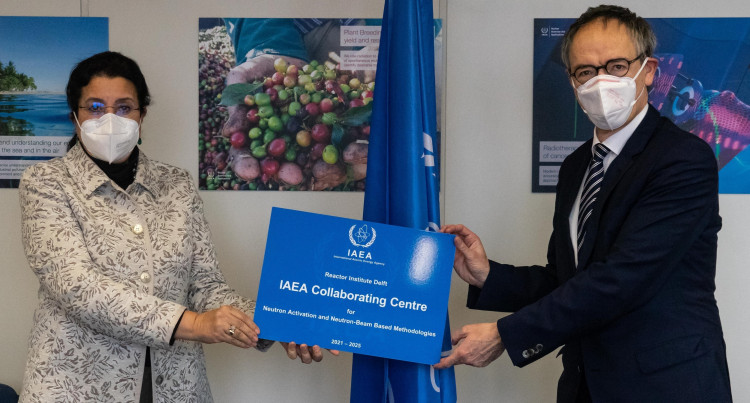The IAEA and the Netherland’s Reactor Institute Delft (RID) have agreed to expand their area of cooperation in Neutron Activation Analysis (NAA) to neutron beam-based methodologies – a key technique in materials research, biology and medicine.
“Thanks to extensive technical advances at RID over the last few years, we can now work together in further areas of nuclear applications,” said Najat Mokhtar, IAEA Deputy Director General and Head of the Department of Nuclear Sciences and Applications, at the signing ceremony of the new agreement today. “RID’s stable isotope tracer methods combined with NAA, for example, can significantly contribute to IAEA activities in forensic sciences.”
Another recent innovation at RID is their flexible irradiation facility – an adjustable chamber for irradiating microscopic spheres, which are made up of tissue-friendly materials and are used to “pack” a radioisotope before it is introduced into the patient’s body. This facility allows a longer irradiation period of the microspheres, making them safer for the patient without damaging the quality of the materials. The principle could be applied in any research reactor and can advance the production of medical radioisotopes used to treat liver cancer. This will be one of the topics discussed at an upcoming IAEA virtual technical meeting on 22–26 March 2021.
“We are currently working on the installation of a cold neutron source at RID to improve the application of neutron scattering,” said Bert Wolterbeek, RID’s Director. “This will allow us to carry out energy research to develop, for example, new battery materials.”
Further technical improvements at RID include their 3D neutron imaging facility and new neutron spectrometer. All these tools can be used to strengthen the collaboration with the IAEA in various fields of nuclear applications.
RID was first designated as an IAEA Collaborating Centre in 2010 and has since then supported the IAEA’s activities in NAA – a well-established non-invasive nuclear technology used to determine the quality and quantity of different elements in the composition of samples and objects. Significant contributions include:
- developing NAA for large samples;
- supporting the IAEA in establishing an integrated approach to routine automation of NAA;
- supporting the IAEA in proficiency testing of national NAA laboratories.
“RID has provided key data and expertise for establishing the IAEA e-learning course on NAA, which has registered users from nearly all IAEA Member States with operational research reactors,” said Danas Ridikas, Head of the IAEA Physics Section. “RID has also developed and currently maintains the k0-IAEA software for analysis of NAA data, which is freely available for use by national laboratories around the world.”
k0-NAA is a type of NAA, which requires a complex software for data analysis. Apart from the IAEA–RID developed k0-NAA software package, there are several other k0-NAA software packages established by national laboratories, but the results obtained with them have never been compared in a systematic way. The IAEA is currently leading, with RID’s support, the first intercomparison analysis to assess the accuracy of these software packages.
RID will continue to support capacity building in nuclear sciences and technologies by hosting training activities, workshops, scientific visits from other countries and by providing expertise to existing and newcomer research reactor facilities.





